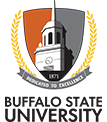
The Social Work program has a long and storied history, beginning with its first accreditation by the Council on Social Work Education (CSWE) in 1975.
Now, in its 5th decade as a CSWE-accredited BSW program, the Social Work program, housed in Caudell Hall, remains committed to its mission of providing students with a strong foundation in generalist social work practice as they prepare for continued studies at the graduate level, or entering the professional world of social work upon graduation.
Mission, Goals, Objectives
Mission
The SUNY Buffalo State Social Work Department prepares students for generalist social work practice grounded in a social justice framework, working with individuals, families, groups, organizations, and communities through applied learning to create community leaders and change agents.
Goals
- To educate students in the knowledge, values, critical thinking, affect, and competency skills necessary for entry-level social work practice with individuals, families, groups, organizations, and communities in diverse settings.
- To educate students in ethical generalist social work practice with a focus on valuing diversity and difference, social and economic justice, and advocating with and on behalf of individuals, families, groups, organizations, and communities in diverse settings.
- To engage in improving the quality of life in the city of Buffalo and the larger community by means of experiential opportunities in diverse settings throughout the curriculum such as service learning, field practice, community events, and international projects.
Objectives
Our graduates will demonstrate the ability to:
- Demonstrate ethical and professional behavior
- Advance human rights and social, racial, economic, and environmental justice
- Engage Anti-Racism, Diversity, Equity, and Inclusion (ADEI) in practice
- Engage in practice-informed research and research-informed practice
- Engage in policy practice
- Engage with individuals, families, groups, organizations, and communities
- Assess individuals, families, groups, organizations, and communities
- Intervene with individuals, families, groups, organizations, and communities
- Evaluate practice with individuals, families, groups, organizations, and communities
As the largest baccalaureate social work (BSW) program in the SUNY system, the Social Work program has a long and storied history, beginning with its first accreditation by the Council on Social Work Education (CSWE) in 1975, when the program was organized within the Department of Human Development, Family, and Community Relations. Soon after, owing to the BSW program’s growth and recognition in the community, it was realigned in 1977, within the Department of Criminal Justice and Social Work, and eventually became an autonomous department in 1986.
Social Work’s accreditation has been reaffirmed by the CSWE in 1980, 1987, 1996, 2002, and 2010, which is reflective of the program’s demonstrated commitment to providing a rigorous, supportive, and innovative learning environment, taught by an award-winning faculty with a breadth of clinical, research, and advocacy experience. For example, the Social Work Department was integral in the development of the Social Services Training Project, later renamed the Center for Development of Human Services (CDHS), which provided training to social workers currently employed in the field. Starting with a $100,000 social services training grant in 1976, CDHS grew to become a nationally recognized training program for human services providers, overseeing more than 30 training programs and $50 million in grant-funded activities.
Recently, the department has increased its emphasis on international social work through its capstone courses and travel opportunities for students in the major. One such project, under the guidance of Associate Professor Emeritus Louis Colca, exposed students to applied research with at-risk students in El Sauce, Nicaragua. Professor Colca’s students presented their research findings at the 2016, 2017, and 2018 Buffalo State College Student Research and Creativity Conferences.
Additionally, in 2016, under the guidance of Dr. Kimberly Zittel-Barr partnered with the Naomi ChinKit Memorial School, in Point Fortin, Trinidad to establish the Trinidad and Tobago International Social Work Program. To date, 18 Buffalo State College Social Work students have traveled with Dr. Zittel-Barr to Trinidad and Tobago to conduct community-based research and provide intervention to local residents.

